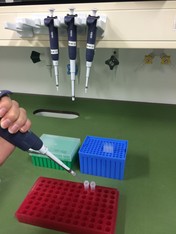Analysis of Rheumatoid Arthritis-specific autoantibody profiles to improve treatment
The objective of this project is to utilize Rheumatoid Arthritis patient serum samples derived from previous conducted clinical studies performed by Bristol-Myers Squibb to profile the autoantibody response in the laboratory facilities of the LUMC. This public-private partnership explores the role of autoantibody profiles as diagnostic tool to predict response to biological treatment in subgroups of Rheumatoid Arthritis patients.
2.3 million Dutch people suffer from rheumatic disorders. For the 210.000 patients diagnosed with the severe rheumatic disease Rheumatoid Arthritis, no cure exists. Currently, 30% of the Rheumatoid Arthritis patients on biological pharmaceuticals do not respond to this expensive treatment, associated with severe adverse effects. Innovations that would reduce the time to predict treatment success from six months to six weeks would save EUR 4.500 per patient on inefficient treatment. Therefore, we need to develop cost-effective health solutions and accelerate their delivery.
Biomarker based diagnostic tests hold a great promise for increasing cost-effectiveness in healthcare by facilitating personalized therapies. Current issues with the development of diagnostic tests are that candidate biomarkers identified in academia do not progress to molecular diagnostic tools in clinical use. There is a considerable disconnect and lack of integration between the science-driven discovery of molecular diagnostics and the subsequent development of a robust diagnostic, clinically validated test. We hope this project will result in the clinical application of molecular biomarkers for improved diagnosis and screening, patient segmentation and monitoring of therapy. This will ultimately contribute to cost-effective improvements of patient outcomes and quality of life.
We expect that our obtained results will support the development of novel diagnostic tests for Rheumatoid Arthritis patients to enable classification of the heterogeneous group of patients into subgroups based on their autoantibody profile. This might lead to innovative therapeutic strategies to treat only specific subgroups of patients with expensive interventions like biologicals.
Website: LUMC



